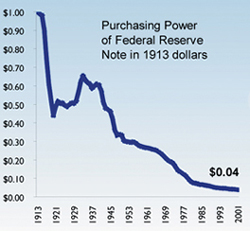[ QUOTE ]
[ QUOTE ]
[ QUOTE ]
[ QUOTE ]
[ QUOTE ]
[ QUOTE ]
Paul made a comment that today's dollar is only worth 4 cents when compared to 1913(?) dollars. What context was this in?
[/ QUOTE ]

As a result, the Federal Reserve Note (US dollar) has lost 96% of its purchasing power since 1913.
Source: U.S. Dept, of Labor, Bureau of Labor Statistics, CPI
[/ QUOTE ]
Link?
[/ QUOTE ]
it's from libertydollar.org and it is inflation.
i don't see a huge problem in using it as a measure of purchasing power (of the basket of goods that headline CPI is composed of).
Barron
[/ QUOTE ]
It depends on how one interprets "purchasing power". The casual listener/reader would react "ZOMG, I can only buy 4% of what I could in 1913, what a disaster".
Of course that is only a portion of the picture. The real question is what does 1 hour (or one month or one year) of my labor buy. As you noted in another thread, you can increase the money supply by printing double the money, but if prices exactly double, and wages exactly double, there is no net impact (lets not get into a tax rate discussion, they can be adjusted too). Yet this kind of "purchasing power" graph would show a decline in purchasing power of 50%, simply because prices doubled.
It is a deceptive at best, meaningless at worst, graph and statement by RP.
[/ QUOTE ]
OK, now i see what you meant.
then yes in this case it is misrepresenting the facts since the real graph of purchasing power would be wage/income growth vs. inflation (i.e. real wage/income growth).
i think that would likely show that we have more purchasing power today than we did back then. this is likely due to increases in productivity from technological advances.
so i'd guess that 1 hrs wage back then would buy less than 1 hrs wage today.
Barron
[/ QUOTE ]
Exactly...and layer on top of that increases in the quality/value of the goods that have actually decreased in "labor equivalent value" and you can dismiss statements like RPs as rhetoric at best.